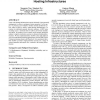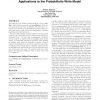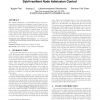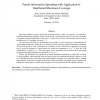105
click to vote
PODC
2010
ACM
15 years 6 months ago
2010
ACM
We study the problem of clock synchronization in highly dynamic networks, where communication links can appear or disappear at any time. The nodes in the network are equipped with...
108
click to vote
PODC
2010
ACM
15 years 6 months ago
2010
ACM
We quantify the effect of Bayesian ignorance by comparing the social cost obtained in a Bayesian game by agents with local views to the expected social cost of agents having glob...
129
click to vote
PODC
2010
ACM
15 years 6 months ago
2010
ACM
During the analysis of packet log files from network experiments, the question arises which received packet belongs to which of the potentially many binary identical send events....
110
click to vote
PODC
2010
ACM
15 years 6 months ago
2010
ACM
Large-scale hosting infrastructures require automatic system anomaly management to achieve continuous system operation. In this paper, we present a novel adaptive runtime anomaly ...
113
click to vote
PODC
2010
ACM
15 years 6 months ago
2010
ACM
We define two new classes of shared-memory objects: ratifiers, which detect agreement, and conciliators, which ensure agreement with some probability. We show that consensus can...
122
click to vote
PODC
2010
ACM
15 years 6 months ago
2010
ACM
We demonstrate how to leverage a system’s capability for allto-all communication to achieve an exponential speed-up of local algorithms despite bandwidth and memory restrictions...
125
click to vote
PODC
2010
ACM
15 years 6 months ago
2010
ACM
We present Gatekeeper, a decentralized protocol that performs Sybil-resilient node admission control based on a social network. Gatekeeper can admit most honest nodes while limiti...
PODC
2010
ACM
15 years 6 months ago
2010
ACM
108
click to vote
PODC
2010
ACM
15 years 6 months ago
2010
ACM
This paper addresses partial information spreading among n nodes of a network. As opposed to traditional information spreading, where each node has a message that must be received...
PODC
2010
ACM
15 years 6 months ago
2010
ACM
We present a proof of safety and linearizability of a highlyconcurrent optimistic set algorithm. The key step in our proof is the Hindsight Lemma, which allows a thread to infer t...




